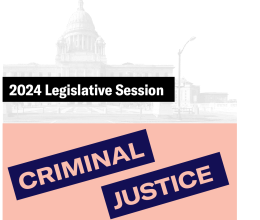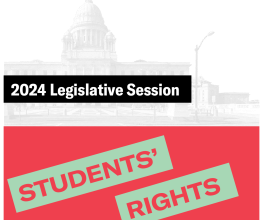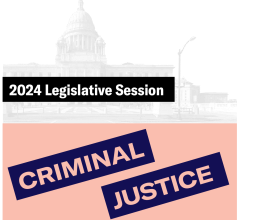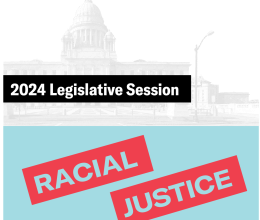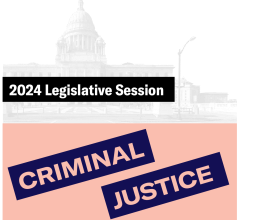The ACLU of Rhode Island and over 20 civil rights and community organizations joined today in the release of a report sharply critical of Governor Donald Carcieri’s civil rights record in his first six months in office. The 16-page report, “Civil Rights and Civil Wrongs in the Governor’s Office,” focuses on five major issues the Governor has dealt with during his term. The report calls his response to them “cause for considerable alarm,” and says they demonstrate “a pattern of ignoring the people with something to say about discrimination when an issue directly affecting them” arises. The report, prepared by the ACLU and two civil rights organizations, concludes with a series of twenty recommendations for the Governor to implement to address the concerns outlined in the report.
The five issues addressed in the report are: Governor Carcieri’s decision not to appoint Superior Court Judge Rogeriee Thompson to a vacancy on the Rhode Island Supreme Court; his failure to demonstrate any leadership at all on the problem of racial profiling by police; his refusal to veto legislation giving the Town of North Smithfield an unprecedented exemption from the state’s Fair Employment Practices Act; his decision to raid the Narragansett Indian smoke shop ; and his unilateral reversal of DMV policies on the granting of driver’s licenses to immigrants without Social Security Numbers.
- Judicial Appointments: Governor Carcieri’s decision not to appoint Superior Court Judge Rogeriee Thompson to a vacancy on the Rhode Island Supreme Court was a lost opportunity of tremendous magnitude and meaning to communities of color, women and all others concerned about a diverse judiciary. Further, the reasons given by the Governor for bypassing her nomination were, to put it mildly, less than compelling.
- Racial Profiling: The Governor has failed to demonstrate any leadership at all – indeed, appears to have done or said absolutely nothing whatsoever – on one of the most pressing race issues of our time, the problem of racial profiling by police.
- North Smithfield and the Fair Employment Practices Act: Perhaps nothing better demonstrates the Governor’s attitude towards civil rights than his decision not to veto a bill opposed by his own anti-discrimination agency and by fourteen other organizations concerned with civil rights. By approving unprecedented legislation allowing a Town a free ride from discrimination lawsuits, the Governor not only ignored the views of civil rights groups, he actively participated in a “compromise” that supported a town’s ability to discriminate so long as the state wouldn’t have to pay for it.
- The Narragansett Indian Smoke Shop Raid: The Governor’s decision to raid the Narragansett Indian smoke shop – and the attendant consequences caught on videotape – has rightly led to widespread national condemnation as well the call for a federal investigation. Unfortunately, it is but the latest example of the Governor acting first, and considering the consequences later, when it comes to interaction involving people of color. The Governor’s further refusal to address questions raised by an internal review of the raid, which he had commissioned from the State Police, only underscores the problems with his involvement in, and response to, this controversial episode.
- Immigrants and Drivers’ Licenses: Ignoring three years of collaborative negotiations between the state and groups representing the state’s burgeoning immigrant community, the Governor unilaterally revised DMV policies on the granting of driver’s licenses to people without Social Security Numbers, a decision of enormous consequence to that community. Both the action he took and the way he took it demonstrate, at best, a bland indifference to the needs and lives of people in the immigrant community.
The report emphasizes that it is not just the Governor’s decisions on these issues that have troubled the minority community, but the way he has made them. In addition to providing details about the Governor’s troubling actions on these issues, the report contains 20 recommendations that the Governor is asked to implement “to address the concerns that this report has raised about his record on civil rights.”
The report was prepared by the R.I. Civil Rights Roundtable, the R.I. Affiliate of the American Civil Liberties Union and R.I. Affirmative Action Professionals (RIAAP). Groups joining in support of the report include the Center for Hispanic Policy and Advocacy; International Institute of R.I.; Progreso Latino; DARE; the Cambodian Society of Rhode Island; NAACP, Providence Chapter; and the Rhode Island National Organization for Women.

